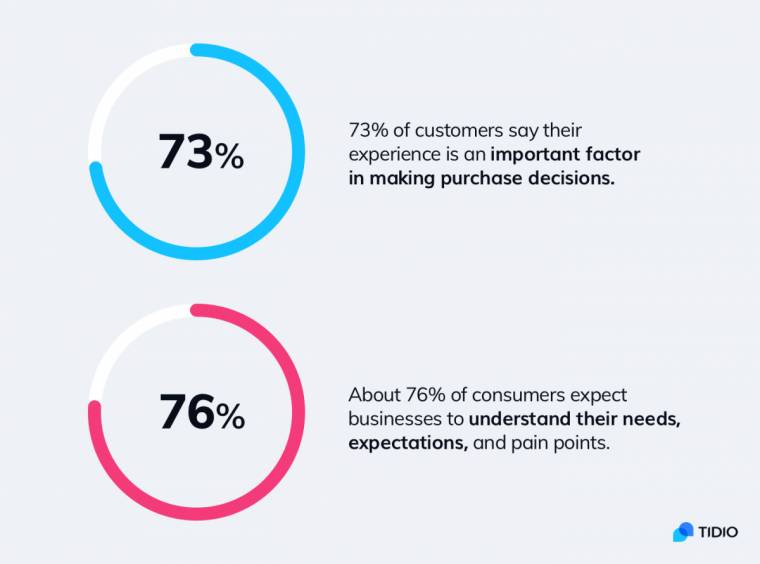Customer Perception: What It Is & How to Improve It
Reputation Staff Writer

Understanding customer perception in marketing is critical to the healthy viability of any company. By analyzing the role of perception in consumer behavior, you can take steps to control how customers view your business and improve customer acquisition and retention.
So, what is customer perception?
In this article, we’ll cover consumer perception, meaning, and its definition. In addition, we’ll outline why it matters for your business.
Once you know what consumer perception is, you can start making progress towards enhancing your company’s image and bottom line.
Why Does Customer Perception Matter?
Your brand’s consumer perception is critically important and should appeal to customers on a more significant level because people buy things based on emotion. As much as businesses hope people make purchases because of sound, logical decisions, that just typically is not the case.
Every customer’s engagement with a company’s brand will impact customer perception, meaning if the customer has a positive interaction, such as receiving products on time and as described, trust and brand loyalty will grow. By garnering an image of a reputable company, the cost of acquisition and retention of clients becomes infinitely more cost-efficient.
Conversely, customers develop a depreciating view of a brand when they have a negative experience, such as defective goods, disputed refunds, no after-sales support, and so on. Aside from affecting the bottom line due to the cost in returns, it will also make acquiring new clients more difficult.
Related: How To Use Customer Delight For Brand Reputation Management
This is why companies need to define consumer perception metrics. By integrating a customer perception definition into the Product Manager’s KPIs, you can measure if a marketing team’s efforts produce beneficial results.
What is Customer Perception?
When answering “What is the customer perception definition?” businesses refer to customers’ awareness, experiences, and feelings about your company and products. Keep in mind that close attention must be paid to how a customer relates to your brand.
Multiple factors influence customer perception, including overt and indirect engagements with a company. Through these interactions, customers develop an opinion about a brand, whether from advertising, ads, customer reviews, social media comments, etc.
Consumer perception begins with the first contact with a company and continually develops as customers engage through different channels. Anything a business does has an impact on how customers perceive it. Everything from the way goods are showcased in a retail store, the colors and shapes in your logo, the ads you make, and the discounts you offer contribute to the overall reputation of your company.
What Influences Customer Perception?
Several factors can affect customer perception, such as:
- Firsthand knowledge
- Marketing
- Influencers
- Customer Feedback
Firsthand Knowledge
The personal experience a consumer had when purchasing and using a product significantly impacts consumer perception. Customers will develop a positive view of the brand if the product, customer service, price, logo, color, discounts, and other factors succeed in making an excellent impression. However, if they did not enjoy their interaction with the brand, it can leave an indelible mark.
Related: Tune in to the Voice of the Customer to Build Trust in Your Brand
Marketing
Marketing is typically the first point of contact a consumer has with any particular brand. Whether through social media, traditional advertising, or other channels, creating compelling ads is one of the most important factors influencing the customer experience. A company’s advertisements and promotions will aid in the creation of a favorable consumer view.
Influencers
Influencers are slowly overtaking friends and family when it comes to affecting someone’s opinion regarding a product. Since people are more likely to purchase items after they have been tried by someone else first, if an influencer has given a product a positive review, they are more likely to try it out.
Customer Feedback

Before making any significant purchases, many people read customer reviews. With this in mind, it’s imperative you collect and encourage customer feedback. Understanding how customer reviews can help or hinder your company goes a long way into managing customer perception.
How Do You Improve Customer Perception?
Many factors that affect consumer perception can seem to be beyond your control. However, the reality is that all perceptions are influenced by how you engage with your customers. Here are some methods for improving customer perception:
Pay Attention to Customer Reviews
Since customer reviews are one of the main influencers over customer perception, it should be one of the first issues you address.
Since every interaction is a chance to affect your consumer perception, if you take the time to listen to and respond to consumer reviews, you can start making consumers feel heard and appreciated.
Related: Customer Reviews Loom Large in Local Search Report
Recognize who the Target Market is
Not everyone will want what you offer, and you certainly can’t please everybody all of the time. Instead, figure out who you’re trying to reach and what that target market wants. This will allow you to tailor and unify your brand’s message through the different marketing channels.
Recognize and Reward Customer Service Excellence
Customers’ perceptions are affected by every interaction they have with your company, which means that every employee impacts their feelings. To create a favorable customer view, you must first develop a customer-centric culture that empowers employees to behave in the customer’s best interests.
Reputation Can Enhance Your Brand’s Image
Customer perception influences how consumers feel about you. As a result, their perception will determine whether they do business with you again and recommend you to their family and friends. In other words, how your customers view you is critical!
While understanding what customer perception is may be the first part of the equation, managing it is the second.
Reputation has the tools you need to discover what your customers want and predict their future needs. With our reputation management services, you’ll have the resources you need to transform every interaction into a competitive advantage. If you use a CRM like HubSpot, Reputation integrates with your CRM to create in-depth dashboards to measure your brand’s reputation and performance to improve your customer experiences and conversions. Contact us today for a free demo!
Keep Reading: How to Use Online Reputation Management to Streamline Customer Experience










